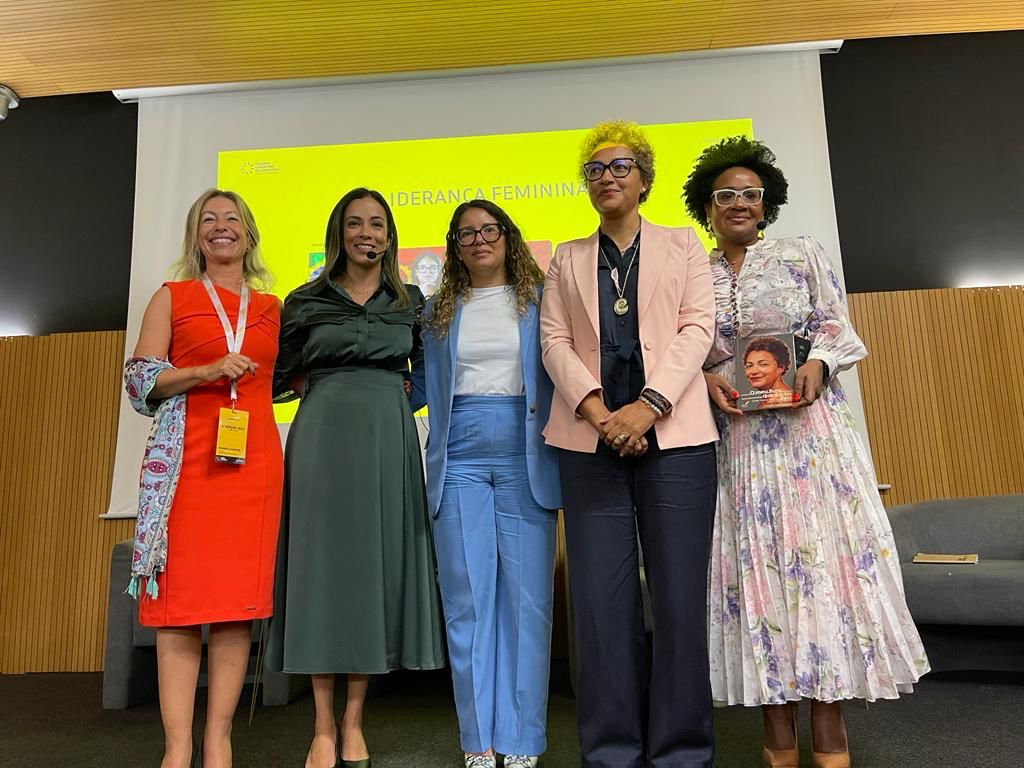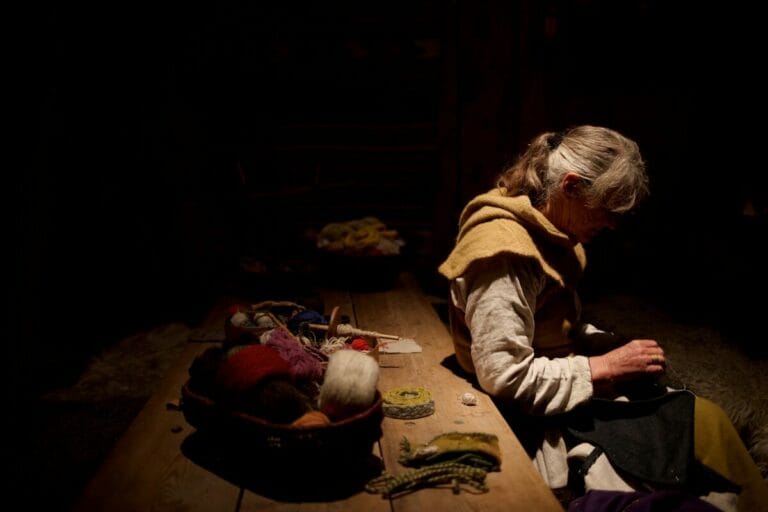Yonne de Castro: The Seat at the Table Will Not Be Handed to Women
In this exclusive interview Yonne de Castro, Eva Rosa Santos, Female Leadership Executive Contributor is asking critical questions about gender equality and female leadership, to encourage women to pursue leadership roles in the face of stubborn gender stereotypes.

In a disheartening revelation, the latest report on gender bias has sent shockwaves through the international community. The report, conducted by a team of researchers from diverse backgrounds and covering various regions, paints a stark picture of gender inequality and the persistent biases against women that continue to plague our society.
The key finding of the report is nothing short of alarming: 9 out of 10 individuals surveyed were found to hold biases against women. This disturbing statistic exposes the deep-rooted nature of gender bias and the significant hurdles that women face in their pursuit of equality.
The report, which employed a wide-ranging methodology, collected data from a large and diverse sample of participants, including individuals of different genders, ages, ethnicities, and socioeconomic backgrounds. It probed into the subconscious biases and stereotypes that often go unnoticed in our daily interactions, shedding light on the systemic discrimination that continues to affect women’s lives.
The implications of this report are profound. Gender bias, often ingrained from an early age through cultural and societal influences, affects women in various ways, from disparities in employment opportunities and wages to limited access to leadership positions and decision-making roles. Such biases also contribute to the perpetuation of harmful stereotypes and discrimination, which further marginalize women and inhibit their full participation in society.
The report’s findings reminds us that addressing these deeply ingrained biases and dismantling the structural inequalities that persist is a matter of urgent necessity. It is a call to action for governments, organizations, and individuals to recognize their roles in perpetuating gender bias and to work toward meaningful change.
Efforts to combat gender bias must include education and awareness campaigns that challenge stereotypes and biases, as well as policies and practices that promote gender equality in the workplace and beyond. A stark reminder that gender bias is a pervasive and insidious issue, this is a powerful catalyst for change, a clear message that women, just like you and me, need to do more together through concerted and sustained efforts to achieve a more equitable and just society for the next generations of girls and boys.
It is a rallying call for all of us to confront our biases, challenge stereotypes, and work together to build a world where every individual, regardless of their gender, can reach their full potential and enjoy the same opportunities and rights. Recently I had the distinct privilege to sit down with Yonne de Castro, a woman who embodies the very essence of unwavering determination and belief in the power of female leadership, a true trailblazer in her own right. Yonne’s words have already resonated deeply with those who have dared to dream and aspire to leadership roles, forging the path forward, fostering change, and perpetuating a legacy of true diversity and inclusivity.
If you want to be part of this inspiring conversation with Yonne de Castro, please keep reading. We go deep into the heart of female leadership, breaking stereotypes, and creating a brighter, more equitable future for all.

As I sit down with Yonne, I can’t help but notice how passionate she is about gender equality and female leadership. In her response to a critical question on how to encourage women to pursue leadership roles in the face of stubborn gender stereotypes, she offered insights that not only captivated our hearts but also stirred our collective resolve.
Yonne’s conviction that breaking down gender-biased stereotypes stands as the paramount necessity resonates with me on a profound level. For her, it is a belief in self, a sense of purpose, and an indomitable spirit that paves the way for women to ascend the ladder of leadership. She firmly proclaims that the seat at the table will not be handed to women on a silver platter, but earned through sweat, determination, and, with luck, fewer tears.
As we explore Yonne’s perspectives on the indispensable roles of society, family, and organizations we notice the need to social shift of gender equality. Her emphasis on women seeking role models beyond their immediate circles and the pivotal need to harmonize the demands of leadership roles with family life adds layers of insight to our dialogue. She told us:
“Breaking gender-biased stereotypes is perhaps the single most important thing societies, families and organizations – in that order – can do to better support and encourage women to pursue leadership roles.
It all starts from the very early ages of our lives, when a sequence of events shapes the way we see ourselves and a perception starts to form in terms of what we can and cannot achieve. A young girl that is constantly conditioned to play with dolls, to wear prince-like clothes, to avoid (child-)naughty behaviors (and therefore avoid taking risks); a girl that reaches teenage years and starts realizing that all house chores related to cooking and cleaning are being attributed to the women in the house; she starts to assimilate her environment and realizes that within the family, most men are the primary care-takers and most women avoid jobs that are too demanding; when she then reaches higher-education years, she further realizes that the references to female leaders both in the public and private sector are minimal; this perpetuates a cycle of disbelief in self.
Breaking such stereotypes from a society stand-point is perhaps the most difficult one, and that in itself requires a reflection worthy of a PHD investigation; factors such as culture, habits and customs, play heavily in many African and Arabic countries. Families however, unless truly brave and utterly convicted, are a result of society, or one of the other; either way, to think of change in one is to think of change in the other and the same goes on to then influence what any given organization can (or cannot) do in the context of that society.
No women’s right was ever achieved because of the battles fought by people other than women themselves, therefore, the journey to get to leadership roles may well be a lonely one, but it takes true belief and a sense of purpose. The seat at the table will not be handed to women, it will continue to be earned with plenty of sweat and hopefully slightly less amounts of tears.
It is therefore important that women continue to believe in what the numbers worldwide are showing: that although slowly, women are achieving more and more leadership positions; it is important that woman, continue to seek for role models other than those in their close circles (society/ family/ organization); and that they understand and are willing to integrate the demands of a leadership position in their family lives.
Society should of course rise up to the occasion, through (again) women who got to the top, coming forward and sharing the issues which affected (and continue to affect) their journey, and by that letting others understand how they felt, which will trigger productive debates and eventually foster change; with male-advocates who feel committed to this cause and understand the relevance and tangible impact of the power of diversity and are willing to be part of the change.
Self-doubt is a common challenge for many aspiring female leaders. Can you share your personal strategies for overcoming this lack of confidence and achieving success in leadership positions?
Self-doubt is that “little devil” in your ear, always coming in the most inappropriate times. Unlike what many women think, it is also very common in men, even men in leadership roles. But it is effectively how we deal with it, that matters the most.
In my case, I have developed an elevator-pitch which by the way, it’s something one ought to have for many other moments. This is a self-pitch where I remind myself of all the accomplishments and characteristics that make me worthy of the role/ moment/ occasion. For example, not long ago, I was invited to a round-table with other seniors of the organization, and I would have to travel to a particular country to attend it; self-doubt immediately kicked-in and I got myself thinking about numerous excuses to give the people who invited me, for not attending. All of that was nothing more than fear of not being up to the challenge.
After realizing it, which is very important and everybody needs to learn to acknowledge when self-doubt is in place, so that they can learn how to let it pass; I pulled in my elevator-pitch and simply reminded myself that “I did not buy a ticket to the chair – I got invited” (period!).
Cultural education plays a vital role in shaping gender perceptions. How can we effectively educate our sons and daughters to believe that they can aspire to any profession or leadership role without gender bias?
I have spoken above about the power of breaking gender-biased stereotypes, and how culture, habits and customs play a heavy role in that. As a mother of two electric, radiant, strong-willed boy and girl, one of my biggest concerns is to make sure that I give them the best possible education. And as much as it entails going to good schools and universities, their father and I play a more important role, as we are effectively the closest role models who will in actual fact shape the way they see themselves and their own career aspirations and possibilities.
Be that as it may, raising children is not an easy task, it wasn’t decades ago, it isn’t now – even more so due to the amount of easily available information children these days have access to. Nevertheless, I am a firm believer that we should start by breaking our own gender biases before we can actually work with our kids; for example, it wasn’t until I attended an amazing leadership program which I have realized I was color-biased, i.e., I would never wear my son with what I considered to be “female colors” (pink, purples, etc.) and so, I left the session and bought him a pair of black and white sneakers, with a splash of flashy-pink.
Nothing, literally nothing changed in him, but I can assure you I got many rolling-eyes from family members and others around me, body-verbalizing their disagreement.
Such acts of identifying and changing your own perceptions, might seem simple, but they are deeply rooted in our core and are exactly the types of triggers which if unattended make us consciously or unconsciously be gender biased.
My daughter on the other hand, who just turned 3, imitates every single thing her brother, who is 6, does, and that involves making a trampoline out of their bed, running erratically or screaming her lungs out. This is important to me, it is my way of letting her know she can experience things, she can be herself, and she can do the same things that her brother does. They are ultimately two different people, with their individualities, but hopefully I am paving the way for us to continue having a relationship whereby we explore on things which will allow them to grow-up accepting themselves and their choices, as well as being more acceptant of others and their choices, and not because society imposes or expects, but because it makes them happy!
Leading by example is often cited as a powerful way to inspire others. Could you share a specific example from your own leadership journey where leading by example made a significant impact on those around you?
This is the type of question which always takes me some time to respond, which I guess speaks to the fact that when you do things because it is part of your values and beliefs, you don’t spend too much time measuring whether there was or there was not a significant impact, even if by essence the positive would be the ideal final result.
Grand gestures are small in nature, and therefore I do not have one specific example to share; what I have is a set of gestures that tend to have quite a positive impact on those around me. Being a top-executive and a young mother has made me a lot more aware and mindful of the fact that work-life balance is often easier said than done; this experience made me a better leader, in a sense that I am much more emphatic and see the person before the professional. I understand that this person, parent or not parent, comes and goes home and needs to juggle other responsibilities, almost like a second job, which is quite extenuating and has a direct impact on their professional performance as well as on the interpersonal relations with peers.
As a gesture, I make sure to record on the calendar my direct report’s leave periods to avoid disturbing them on their leave, which to me is paramount to exercising a culture of well-being.
Technology has evolved so much that there is no reason why one should communicate with fellow co-workers outside of working hours, so I don’t do it! Especially because, more often than not, an e-mail from me or any other top executive of the company is perceived as one that requires immediate response from the reader.
Another important gesture is to make the very best to know about people’s main life events and be present; not necessarily physically present but either sending an sms, calling or sending flowers. Consistently showing people that you care and that you are there for them is not a Herculean task, all it takes is for you to be human.

Do you want to share your story and inspire our readers ? Know that every story is paving the way for a brighter, happier future.





